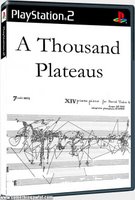Where did I want to go with that question? I had intended to talk about Deleuze and Guattari's contributions to what, for lack of a better term, might be called the philosophy of knowledge (and I'm purposefully trying to avoid using the word "epistemology" here). They develop this line of work both individually and collaboratively, though their most pointed statement comes in their final venture together, What Is Philosophy? If I'm reading WIP? and other works (e.g., Deleuze's Proust and Signs) correctly, concepts (what epistemologists might call "knowledge") inhere in things, and it's up to philosophers and other cultural workers to extract and articulate them.
I'll say that I'm seduced by this notion, though I'm uncomfortable with the kind of "reading" practice it seems to imply. Theoretically, from a Deleuzo-Guattarian standpoint, one is affected in such a way by a thing that she/he can be moved to extract whatever concept or concepts happen to inhere in it. Perhaps. But isn't that a hop, skip, and a jump away from the kind of literary reading--of feeling the meaning of a literary work "on your pulse"--that defined the work of people such as F. R. and Q. D. Leavis and others? How is Deleuzo-Guattarian knowledge production not, at some level, a sort of virtuoso protocol for reading culture?
 That question seems to me less lame, and honestly it's one I'm going to need some time to work through. For now, because this has been a fairly heady entry (most of my summer posts admittedly have been on the lighter side), I figured I'd end with an image my colleague John Lucaites sent me from somethingawful.com. Sony, like many these days, apparently is becoming Deleuzo-Guattarian..... ;)
That question seems to me less lame, and honestly it's one I'm going to need some time to work through. For now, because this has been a fairly heady entry (most of my summer posts admittedly have been on the lighter side), I figured I'd end with an image my colleague John Lucaites sent me from somethingawful.com. Sony, like many these days, apparently is becoming Deleuzo-Guattarian..... ;)
2 comments:
Hi Ted,
I like the question, but, I wonder if not the value of all "reading" practices are not in some way the effect of a virtuoso reading protocal. Though, I suspect that is your point. As many others have suggested, but, more recently Gaonkar and Povenelli, I am wondering it it is wrong to turn D/G into an interpretive/hermenuetic apparatus (something I see happening all the time, thus re-producing the virtuoso reader). Is there a difference between the book and the diagram as the metaphor for producing knowledge? Which I guess is another way of saying is the diagram the alternative to a virtuoso reading strategy? Though, like a good debater I can argue from an oppostie premise: should we be so afraid of such a virtuoso reading strategy (While my tendency is to reject virtuoso postures outright, but, I am less afraid of it as a way to produce insight/knowledge/perspective than I am of it as a normative ideal that becomes/is depoyed as a cultural technology for manufacturing particular cultural elites--what Miller calls, I think, an ethic of incompleteness).thanks for the post, I was having a similar conversation today at lunch and wondering how to peform a post-hermenuetic or post reading/textual but very materailist approach to rhetorical criticism. Have you read Montag's new introduction of Althusser? Wondering if some of the issues are not re-staged there.
Hi Ron,
I see your point, and as always you ask all the right questions. Three things...
First, I think you're right to raise the issue of, for want of better terms, social "textuality" and "diagrammatic" reality. I think of the former as a more coherent entity, whereas the latter is more schematic--realized only in practice. To me that suggests that "diagrams" don't exist to be read per se, or as Deleuze would say in Proust and Signs, reading their significations isn't particularly "profound."
Second, I am, like you, taken with the idea of circulation and all that it entails. I wonder, though, about objects that do become inert or that come to rest? Books, for example, circulate, but many enjoy a life sitting on a bookself, for all practical purposes going nowhere. Inasmuch as I like and refer frequently to the notion of circulation (as an operative methodological principle and as a descriptor of cultural life), I'm uneasy with any ur-term that seems to offer significantly more complete explanatory power.
Finally, you do raise a provocative question: is there any way out of the virtuoso reading? I'm not altogether convinced that there is, at least with respect to academic publishing in the humanities as it's been traditionally defined. That said, I wonder if what's at stake is less the "act" of reading (however that's defined) than what's ultimately getting "read." Again, Proust and Signs is my referent, where Deleuze outlines four different types of signs (worldly, love, sensuous, art) ranging from least to most profound. Perhaps what sets one reading apart from another is one's ability to grasp--or to mobilize--a particular kind of sign. Indeed, signs of art, for Deleuze, seem to be inventional resources whose "reading" helps to usher in new realities (as opposed to "describing" or "criticizing" already existing realities or aspects thereof).
My two cents. Clearly there's a lot going on here....
Post a Comment